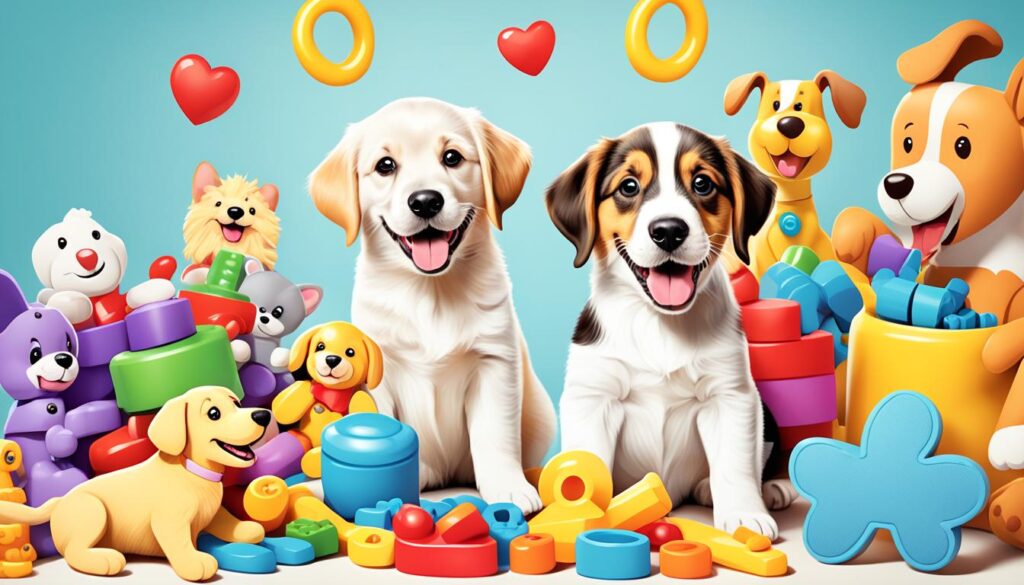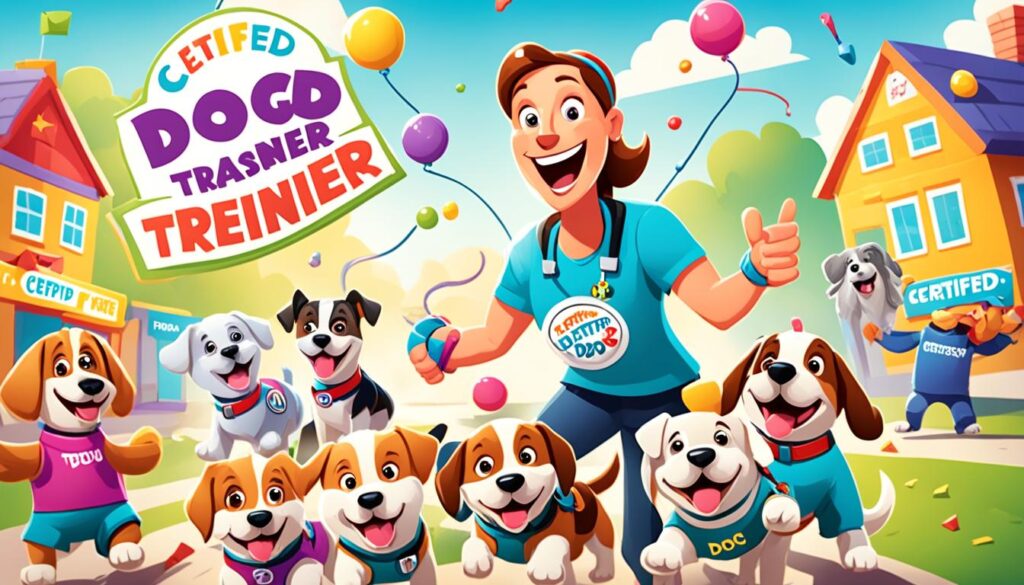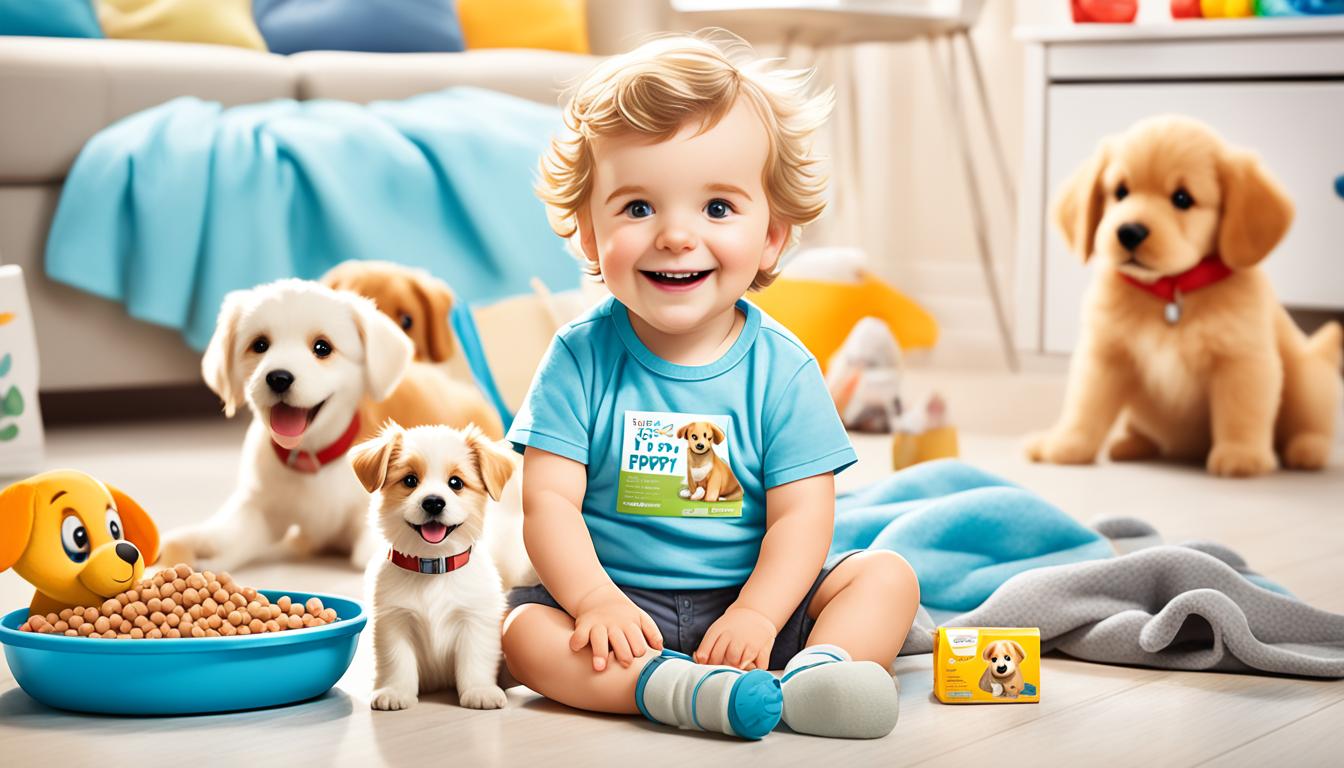Puppy Power: Nurturing Growing Bodies
Did you know that puppies go through a rapid growth phase during their formative stage? During this time, their bodies undergo significant changes, both in size and development. Providing the right care and nurturing during this crucial period is essential for their well-being and future development. In this article, we will explore the concept of “puppy power” and how it can make a difference in shaping your furry friend’s growth and behavior.
Key Takeaways:
- Understanding the energy and enthusiasm of puppies is crucial for effective training.
- Channeling a puppy’s energy through physical and mental stimulation is essential for their well-being.
- Positive reinforcement training methods create a positive learning experience for puppies.
- Consistency and routine play a vital role in shaping a puppy’s behavior.
- Socialization and exposure to various environments contribute to a well-rounded adult dog.
Understanding Puppy Power
Puppies are bursting with energy, curiosity, and enthusiasm. Their playful nature and eagerness to explore the world around them make them perfect candidates for training. To make the most of their boundless energy, it’s essential to understand the concept of puppy power and how it can be harnessed effectively.
Puppies possess an innate sense of adventure and an insatiable desire to learn. Their energy levels are seemingly limitless, and they’re constantly inquisitive about their surroundings. This enthusiastic nature provides an excellent opportunity for training and shaping their behavior.
By tapping into their natural enthusiasm, we can create a positive and productive training experience. Understanding the importance of recognizing and utilizing puppy power is key to developing a solid training foundation. By harnessing their energy and eagerness to please, we can shape them into well-behaved and obedient companions.
Unleashing Their Enthusiasm
To effectively utilize puppy power, it’s crucial to engage them in stimulating activities that channel their energy in a positive way. Regular exercise is essential to burn off excess energy that can often lead to destructive behaviors. Interactive play sessions not only provide physical exercise but also mental stimulation, keeping their curious minds engaged.
Training sessions should be engaging and incorporate activities that allow puppies to showcase their enthusiasm. Interactive games, such as teaching them to fetch or hide and seek, can be effective tools for training. Making training sessions fun and rewarding helps keep their excitement levels high and facilitates faster learning.
A Unique Approach
Puppies have unique needs and characteristics that set them apart from adult dogs. Understanding their developmental stage, shorter attention spans, and desire for immediate gratification is essential when designing training methods.
Using positive reinforcement techniques, such as treats, praise, and play, taps into their natural drive to please their owners. Rewarding desired behaviors and ignoring unwanted ones encourages them to repeat the behaviors we want to reinforce. This approach helps build a strong bond between the owner and the puppy, as well as fosters a positive and rewarding learning experience.
“Puppy power is like a clean slate waiting to be filled with good habits and behaviors.”
Consistency is another critical aspect of training. Establishing clear expectations and routines helps puppies understand what is expected of them. By providing consistent cues and rewards, we can reinforce desired behaviors and reduce confusion.
To leverage their enthusiasm effectively, it’s crucial to invest time and effort into understanding puppy power. By recognizing their unique needs, employing positive reinforcement techniques, and maintaining consistency, we can unlock their full potential and set them up for a lifetime of well-behaved behavior.
Channeling Energy into Training
To maximize a puppy’s energy and promote effective training, it is crucial to provide them with appropriate outlets for both physical and mental stimulation. By engaging their minds and bodies in productive activities, we can not only help burn off excess energy but also foster focus and concentration. Let’s explore the importance of regular exercise, interactive play sessions, and structured training activities in channeling a puppy’s energy in a positive way.
The Benefits of Regular Exercise
Regular exercise plays a vital role in a puppy’s physical and mental well-being. It helps to burn off their abundant energy and keep them fit. Daily walks, interactive games, and activities that allow them to explore and discover their surroundings are highly beneficial. Not only does exercise allow puppies to release their pent-up energy, but it also promotes better behavior by reducing restlessness and potential destructive behaviors.
Interactive Play Sessions
Interactive play sessions provide puppies with mental stimulation, socialization opportunities, and the chance to bond with their human companions. These sessions can involve games such as fetch, hide and seek, or puzzle toys that challenge their problem-solving skills. By incorporating play into training sessions, we create a positive association with learning and reinforce desired behaviors in an enjoyable and engaging way.
Structured Training Activities
Structured training activities are essential for teaching puppies obedience, manners, and foundational skills. Consistent and structured training helps channel their energy into constructive behaviors and promotes mental stimulation. Incorporating commands, rewards, and positive reinforcement during training sessions will help puppies understand boundaries, develop self-control, and build a strong foundation for further training.
| Benefits of Channeling Energy into Training: |
|---|
| 1. Burns off excess energy |
| 2. Fosters mental focus and concentration |
| 3. Promotes physical and mental well-being |
| 4. Reduces restlessness and destructive behaviors |
| 5. Enhances the bond between puppy and owner |
By channeling a puppy’s energy into training activities, we create a harmonious and well-balanced relationship while successfully teaching them important skills. The physical and mental stimulation provided through exercise, interactive play, and structured training not only benefits their overall health but also contributes to shaping them into well-behaved and contented companions.
Positive Reinforcement Training
Positive reinforcement training is a highly effective method for teaching puppies new behaviors. By utilizing rewards such as treats, praise, and play, owners can motivate their puppies to repeat desired behaviors and reinforce positive actions.
This type of training focuses on rewarding good behavior rather than punishing undesirable behavior. By implementing positive reinforcement techniques, owners create a positive and enjoyable learning experience for both themselves and their puppies.
When using positive reinforcement, it is important to choose rewards that are reinforcing to the individual puppy. Some puppies may respond well to treats, while others may prefer verbal praise or playtime.

When a puppy performs a desired behavior, such as sitting on command or coming when called, they should be rewarded immediately. This association between the behavior and the reward helps the puppy understand what is expected of them and encourages them to continue displaying good behavior.
“Positive reinforcement training helps establish a strong bond between the owner and the puppy, as it creates trust and builds confidence.”
The key to successful positive reinforcement training is consistency. By consistently rewarding the desired behavior and providing clear cues, puppies learn to associate the behavior with the reward, making it more likely that they will repeat the behavior in the future.
This training method not only helps puppies learn new behaviors but also strengthens the bond between the owner and the puppy. It fosters a positive relationship based on trust, respect, and mutual understanding.
To summarize, positive reinforcement training is a highly effective and humane approach to teaching puppies new behaviors. By using rewards, owners can motivate and reinforce positive actions, creating a positive and enjoyable learning experience for both the puppy and the owner.
Consistency and Routine
When it comes to harnessing puppy power, consistency and routine play a crucial role. By establishing clear expectations and using consistent training methods, cues, and rewards, you create a structured environment that helps puppies understand desired behaviors and confidently respond to commands.
A consistent routine provides puppies with a sense of predictability and stability, which reinforces their training and sets them up for success. It helps them develop good habits and learn what is expected of them in various situations.
Routine and Training Methods
Consistency in training methods ensures that puppies receive clear, concise instructions that they can easily understand and follow. Whether you’re using clicker training, positive reinforcement, or other techniques, it’s important to remain consistent in your approach.
“Consistency is key in training. Using consistent methods allows your puppy to confidently learn and respond to cues, reinforcing positive behavior.”
Consistency also applies to the cues and commands you use. Using the same words, gestures, or signals consistently helps your puppy associate the cue with the desired behavior, making it easier for them to respond appropriately.
Rewards and Reinforcement
Consistency extends to the rewards and reinforcement you provide during training. By consistently rewarding and reinforcing positive behaviors, you’re teaching your puppy what behavior is desirable and encouraging them to repeat it.
“Consistent rewards help your puppy understand which behaviors are valued and encouraged, ensuring a positive and effective training experience.”
Whether it’s treats, praise, playtime, or a combination of these rewards, being consistent in your positive reinforcement helps your puppy understand the connection between good behavior and enjoyable outcomes.
Remember, consistency and routine go hand in hand when it comes to training a puppy. By establishing clear expectations, using consistent training methods and cues, and providing consistent rewards, you create an environment that supports your puppy’s learning and growth.
With a consistent routine and training approach, your puppy will gain confidence, learn desired behaviors, and develop into a well-behaved adult dog.
Socialization and Exposure
Proper socialization plays a crucial role in fostering well-rounded and confident adult dogs. By exposing puppies to different people, animals, and environments from a young age, we can help them develop positive associations and build their confidence in new situations.
This exposure allows puppies to become familiar with various sights, sounds, and experiences, reducing the likelihood of fear or anxiety later in life. It also helps them learn how to interact appropriately with other dogs and humans, promoting positive social behavior.
To ensure the best outcomes, consider enrolling your puppy in puppy socialization classes. These classes provide a controlled environment where puppies can interact and learn from one another under the guidance of experienced trainers.

Controlled interactions with other friendly dogs can also be beneficial. Encourage playdates with well-behaved canine companions to help your puppy learn how to communicate and engage in appropriate play behavior.
Exposing your puppy to a variety of experiences and surroundings creates a strong foundation for their future social interactions and overall behavior. By providing positive and enriching exposures, you are setting them up for success as well-rounded adult dogs.
Benefits of Socialization and Exposure
Here are some key benefits of socialization and exposure for puppies:
- Development of positive associations with various people, animals, and environments
- Improved confidence and reduced fear or anxiety
- Promotion of positive social behavior with other dogs and humans
- Prevention of behavioral issues, such as aggression or reactivity
- Enhanced adaptability to new situations and environments
Remember, socialization and exposure should be a positive and gradual process. Always prioritize your puppy’s well-being and comfort, and seek guidance from professional trainers or behaviorists if needed.
Patience and a Positive Attitude
When it comes to training a puppy, patience and a positive attitude are essential qualities to cultivate. Puppies are inquisitive and eager to explore the world around them, and they rely on us, their owners, to guide them through the learning process. It’s important to remember that mistakes are a natural part of the journey, and a patient and understanding approach is necessary for their development.
Staying calm and composed while training your puppy is crucial. Frustration or resorting to punishment-based methods can hinder their progress and create a negative learning environment. Instead, focus on reinforcing positive behaviors. Celebrate and reward your puppy when they demonstrate the desired actions. This reinforces their understanding of what is expected and encourages them to continue exhibiting those behaviors.
“Patience is not the ability to wait, but the ability to keep a positive attitude while waiting.” – Anonymous
Maintaining a positive attitude throughout the training process is key in building a trusting and loving bond with your puppy. It ensures that they associate training sessions with positive experiences and strengthens the connection between both of you. Your positive attitude serves as a source of encouragement, motivating them to engage in the learning process with enthusiasm.
Reinforcing Positive Behaviors
Reinforcement is a powerful tool in shaping your puppy’s behavior. By consistently rewarding positive actions and behaviors, you reinforce their understanding of what is expected and increase the likelihood of those behaviors being repeated. Positive reinforcement can be in the form of treats, praise, or playtime, allowing you to celebrate your puppy’s successes and further strengthen your bond.
It’s important to remember that learning takes time, and each puppy learns at their own pace. Patience is key during the training process. Avoid rushing or expecting immediate results. Instead, embrace the learning journey with your puppy and celebrate each step forward. By fostering a patient and positive approach, you create a supportive environment that nurtures their growth and development.
| Benefits of Patience and a Positive Attitude in Puppy Training |
|---|
| 1. Creates a positive learning environment for your puppy |
| 2. Strengthens the bond between you and your puppy |
| 3. Encourages consistent and desirable behaviors |
| 4. Builds trust and confidence in your puppy |
| 5. Fosters a love for learning and obedience |
By embracing patience and maintaining a positive attitude, you set the stage for a successful and enjoyable training experience with your puppy. Remember, they are learning and growing, just like we are. Together, you can navigate the challenges and triumphs of puppyhood, forging a lifelong bond built on patience, love, and understanding.
Seeking Professional Help
If challenges or feelings of overwhelm arise during the training process, it is essential to seek professional help. A qualified dog trainer can provide expert guidance tailored to the specific needs of your puppy and help address any behavior issues that may arise. By enlisting the assistance of a professional, you can ensure the success of your puppy’s care and training journey.
“A qualified dog trainer can provide invaluable assistance in addressing behavior issues and achieving desired training outcomes. Their expertise and experience enable them to diagnose problem areas, design effective training strategies, and provide ongoing support throughout the process.”
When choosing a qualified dog trainer, it is important to look for someone who is knowledgeable, experienced, and uses positive reinforcement techniques. A professional trainer will have a deep understanding of dog behavior and training methods, enabling them to tailor their approach to your puppy’s individual needs.
By seeking professional help, you can benefit from:
- Expertise: A professional dog trainer has the necessary knowledge and skills to address behavior issues and provide effective training solutions.
- Personalized Guidance: They can create a customized training plan that meets your puppy’s specific needs and goals, ensuring the best possible results.
- Consistency and Structure: A qualified trainer will help establish a consistent training routine, providing clarity and structure for both you and your puppy.
- Problem Solving: They can assist in troubleshooting any challenges or setbacks you may encounter along the way, offering solutions and support.
Remember, seeking professional help is not a sign of failure, but rather a proactive step towards ensuring the well-being and success of your puppy’s training journey.

Puppy Kelpie Training Review
| Training Service | Price | Rating |
|---|---|---|
| Puppy Perfect Training | $200 | 4.8/5 |
| Canine Connection Academy | $180 | 4.6/5 |
| Pawsitive Pup Training | $250 | 4.9/5 |
Conclusion
Nurturing and caring for a growing puppy is a rewarding experience that requires attention, patience, and a positive approach. By providing proper puppy care, focusing on their growth and development, and implementing effective training methods, we can guide them towards becoming well-behaved and happy adult dogs.
Understanding the unique needs of puppies and harnessing their energy is key to successful puppy care. By providing appropriate outlets for physical and mental stimulation, such as regular exercise and interactive play sessions, we can channel their energy in a positive way and foster their overall well-being.
Socialization and exposure to different people, animals, and environments are crucial for puppies to develop into well-rounded adult dogs. Creating positive associations and building their confidence in new situations through controlled interactions and puppy socialization classes will set them up for a lifetime of positive social experiences.
In addition to consistent training methods and routines, positive reinforcement is an effective tool for teaching puppies new behaviors. By using rewards, such as treats, praise, and play, we can motivate them to repeat desired behaviors and create a positive and enjoyable learning experience.
FAQ
What is puppy power?
Puppy power refers to the energy, curiosity, and enthusiasm that puppies possess. It is their natural drive to explore their environment and learn new things.
How can I harness puppy power for successful training?
To harness puppy power for successful training, it is important to understand their unique needs and characteristics. By tapping into their natural enthusiasm for life and eagerness to please, you can use their energy in a positive way during training.
What are some ways to channel a puppy’s energy into training?
Providing appropriate outlets for physical and mental stimulation, such as regular exercise, interactive play sessions, and structured training activities, can help channel a puppy’s energy in a positive way.
What is positive reinforcement training?
Positive reinforcement training is a method that uses rewards, such as treats, praise, and play, to motivate puppies to repeat desired behaviors. This type of training focuses on rewarding good behavior rather than punishing undesirable behavior, creating a positive and enjoyable learning experience.
Why is establishing consistency and routine important in puppy training?
Establishing a consistent routine helps puppies understand the desired behaviors and confidently respond to commands. Using consistent training methods, cues, and rewards ensures that the puppy understands what is expected of them, creating a positive and effective training environment.
How can I socialize my puppy effectively?
Socializing your puppy effectively involves exposing them to a variety of people, animals, and environments from a young age. This exposure helps them develop positive associations and builds their confidence in new situations. Puppy socialization classes and controlled interactions with other friendly dogs can also be beneficial.
What should I keep in mind during the training process?
It is important to be patient and maintain a positive attitude during the training process. Understand that puppies are learning and exploring the world around them, and that mistakes are part of the process. Avoid getting frustrated or resorting to punishment-based methods and consistently reinforce positive behaviors.
When should I consider seeking professional help for puppy training?
If you encounter challenges or feelings of overwhelm during the training process, it is recommended to seek professional help. A qualified dog trainer can provide guidance tailored to the specific needs of your puppy and help address any behavior issues that may arise.



